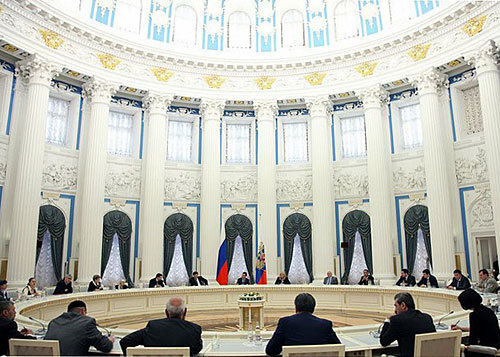
19 May 2010, 20:00
NGO leaders had their say on the situation in the North Caucasus at the meeting with Medvedev and Khloponin
Today in the Kremlin, Russia's President Dmitry Medvedev held a meeting with the activists from non-governmental organizations. During this meeting, Medvedev backed out of a creation of the council of elders in the North Caucasus and specified the problems of his particular concern in the region. At the meeting, the human rights activists, who were engaged in monitoring of human rights violations in the region, presented their reports - previously posted in the "Caucasian Knot", voicing criticism of the government actions in the North Caucasus.
We remind you that in the meeting, which was organized by the Presidential Council on Civil Society Development and Human Rights headed by Pamfilova, presidential envoy in the North Caucasus region, Alexander Khloponin, participates.
In his welcome speech to the meeting, Medvedev promised that all the speeches and contributions would be recorded and posted on the presidential website, and a report on joint work would be disclosed.
International human rights organization "Human Rights Watch", presented by its researcher Tanya Lokshina, who participated in the meeting but did not managed to deliver a report, wholeheartedly welcomes this meeting and views it as an indication of the Russian leadership's genuine concern about the deteriorating human rights and security situation in this turbulent region. The full report, however, was not read out at the meeting.
Medvedev counts on participation of human rights activists in solving the North Caucasus problems
Dmitry Medvedev backed out of a creation of the council of elders in the North Caucasus, the initiative which was advanced by chairman of the Presidential Council on Civil Society Development and Human Rights Ella Pamfilova.
Medvedev also supported injection of small business grants in the region. According to Pamfilova, this practice might be useful for the young people's engagement in small businesses. "The positive experience of Dagestan in this domain could be adopted", Pamfilova believes.
She also suggested thinking over the educational programs for the North Caucasus youth in other Russian regions, as well as "alternative recruiting training that should be arranged with the engagement of experts from public organizations with a view to prevent conflicts arising from military service of Caucasians", ITAR-TASS reports.
During the meeting, Dmitry Medvedev urged non-governmental organizations to associate themselves with averting the Russian people outflow from the North Caucasus Federal District, which, in president's words, has become the most serious and separate problem hindering the meaningful economic development.
According to Medvedev, corruption in the North Caucasus directly threatens the national security of the country and is a fact of aiding the separatists. "Corruption in the North Caucasus is another specificity that distinguishes it from corruption in Russia as a whole, in other areas of our country. This corruption is of clannish nature, which assuredly complicates the fight against it", the presidential official website quotes.
Medvedev also points out that the armed insurgents in the Caucasus have become part of the international criminal community and engage in their activities from various social strata in this region. He quoted the Interior Ministry data, according to which, in 2009, there were committed 544 terror crimes in the North Caucasus. Above 750 attacks on the life of law enforcement officers were committed, 235 of them killed, 686 injured. Over the past 12 years, 20 Muslim clerics were killed, six of them were injured. Over the 2008 - 2010 period, there were committed more than a dozen murders of prominent journalists and human rights activists.
Human Rights Center "Memorial": respect for human rights in the North Caucasus is the only condition for solving the backlog of problems there
Among the participants, there were several members of Human Rights Centre "Memorial".
Svetlana Gannushkina spoke about the inadmissibility of using the methods of state terror in the fight against terrorism. "The ideology of terrorism is simple: collective guilt, collective responsibility, collective punishment, - Gannushkina said. - Solely the personal law, the rule of law and respect for human rights could be opposed to this."
The expert gave the presidents details about the campaign of harassment of the suspected insurgents' families that the Chechen authorities began in 2007.
Statement from the HRC "Memorial" to the "Caucasian Knot" editorial staff says that Gannushkina also spoke about problems of human rights activists who are in fact equated by the Chechen authorities with terrorists. "In Ingushetia, we see an example of cooperation between the authorities and civil society. And this brings obvious benefits", Gannushkina believes. The expert hoped that the situation in Dagestan would be steadily evolving. She described the case of detention in the village of Babayurt in April 2010, when joint operational activities of the authorities, journalists and human rights resulted in the release of illegally detained people.
Gannushkina spoke about other ways of the civil society-government interactions that contribute to viable solutions of problems faced by the North Caucasus people, for example, about the "Memorial" program on small businesses facilitation in the Prigorodny district of Republic of North Ossetia-Alania. Such programs foster harmonization of interethnic relations in the region.
Speaking about the situation in Ingushetia, Timur Akiyev said that it has been deteriorating gradually since 2002. "Abductions, murders during detention, tortures during interrogation provide a mobilization base for the underground. The change of power in 2008 was taken with approval in the republic. Evkurov's team shaped the course, radically different from that of his predecessors', i.e. towards the restoration of the law, transparency, dialogue with society and the opposition", a human rights activist stressed.
He noted with regret that the situation in Ingushetia has not yet stabilized, despite the correctness of the course taken by the authorities, and identified two main reasons - the neglect of the situation and people's distrust of the authority.
Repeating the other speakers, Akiyev noted that the fight against terrorism must be carried out in accordance with the law. "Respect for human rights does not contradict the goal of national security, and non-governmental human rights organizations are allies of the government agencies in the fight against terrorism and banditry", Akiyev stated. In conclusion, he reminded of a still unsolved problem of refugees from Chechnya and North Ossetia.
Oyub Titiev spoke about the human rights problems in the Chechen Republic. The main problem is missing persons, search of their bodies. Over the past decade, according to incomplete data, anywhere from three to five thousand persons went missing.
Even when the bodies are found, it is usually impossible to identify them. Members of Human Rights Center "Memorial" offered a solution to the problem: setting-up of a laboratory for identification of bodies along with a database of DNA of missing persons' close relatives and making efforts to establish identification for each unidentified body. The number of missing persons would drop manifold, Titiev trusts.
Another problem of the Chechen Republic is impunity. Criminal cases of abduction are not investigated. Even when the names of criminals and their vehicles plate numbers are known, the investigation agencies argue that it is impossible to identify persons involved in the crime.
Zaur Gaziyev, a "Memorial" member in Dagestan, said that the terror acts, abductions, tortures, extrajudicial executions, extremist underground revitalization in Dagestan resulted from the civil strife the local community is being at.
He believes it is because the authorities have chosen the wrong tactics for communicating with salafits, the latter increasingly find themselves under the influence of fundamentalists. "In Dagestan, there has emerged such environment that would generate more and more new female suicide bombers and shakhids", Gaziyev thinks.
According to the expert, the main violator of civil rights is the Interior Ministry. Torture of suspects, sometimes resulted in death, have become a common practice of the Dagestani militiamen, but to hide their unlawful actions, IM officers claim that people died in the clashes, Gaziyev pointed out.
Deputy of the State Duma from Kabardino-Balkaria, a member of the Working Group of the Russia's Public Chamber on the North Caucasus problems Adalbi Shkhagoshev, who was invited to the meeting as a co-founder of the Forum "Caucasus. Tradition and Modernization", placed the main emphasis in his speech on the need for maintenance of the Interior Ministry reform and for qualitative improvement of operational work in the regional departments of the Interior Ministry.
In addition, a Deputy from Kabardino-Balkaria focused on projects for the youth, who should be permanently engaged in dialogue and shown the positive changes that are taking place in the North Caucasus.
From the list of participants earlier posted by the "Caucasian Knot", only Alexander Cherkasov did not manage to speak out at the meeting but his speech was passed to the President in writing. "The Counterterrorist operation" in the North Caucasus has been lasting for a decade, but the terror persists. We consider that common explanations - limited area of operations, insufficient powers - distract from the obvious fact: the "counter terror" methods themselves reproduce terrorism", Alexander Cherkasov's report states.
In his opinion, the struggle is often carried on not with terrorists but with those who profess Islam, different from Sunni or Sufi Tarikat that are traditional to those places. According to Cherkasova, torturing of terrorism suspects has become the rule and it deprives the State of its main advantage - the moral one - over the terrorist underground.
Report of the chairman of the Interregional committee against torture, the head of the headquarters of the Consolidated Mobile Group in the Public Commission of the Chechen Republic Igor Kalyapin, who attended the event, was dedicated to investigation of people's missing after being detained by law enforcement officials.
It should be noted that on the eve of the meeting, the "Caucasian Knot" correspondents asked the activists of social and political organizations that would participate in the meeting, to answer the question: "What initial steps should be taken to change the situation in the North Caucasus?".
The respondents have identified some of the most pressing - from their point of view - problems that should be discussed and solved. They are social problems and employment, corruption, clannishness and bureaucratic lawlessness, the legal basis for the actions of law enforcement bodies and the fight against terrorism.
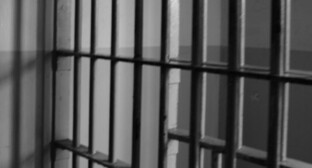
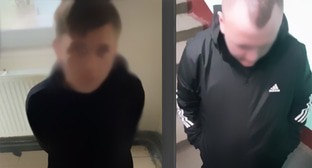
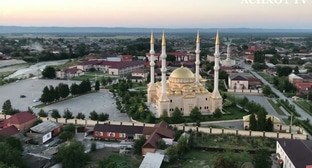
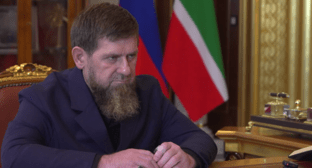

Комментирование через Кавказский узел